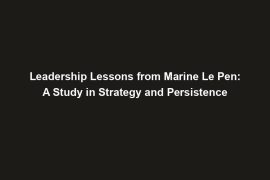Hey there, fellow leadership enthusiasts! Today, I’m excited to dive into the fascinating world of Dominique de Villepin, a French politician and diplomat renowned for his exceptional leadership skills and unwavering integrity.
With a background steeped in diplomacy, de Villepin has made a name for himself through his emphasis on dialogue, negotiation, and peaceful resolutions in the face of complex international situations. His diplomatic prowess was clearly demonstrated during his opposition to the Iraq War and his tireless efforts to promote global cooperation.
As we explore de Villepin’s diplomatic approach, we’ll uncover valuable lessons that can be applied to leadership roles across various industries. From the power of effective communication to the importance of maintaining moral courage, there’s so much to learn from this visionary leader.
So, get ready to be inspired as we delve into the diplomatic strategies and leadership lessons of Dominique de Villepin. Who knows, you might just walk away with a new perspective on what it means to be a truly impactful leader! Stay tuned for more insights in the following sections.
The Diplomatic Approach of Dominique de Villepin
When it comes to diplomacy, Dominique de Villepin is a master of negotiation and dialogue. He believes in the power of peaceful resolutions, emphasizing communication and cooperation over aggression and conflict. His diplomatic strategies have not only earned him recognition on the world stage but have also led to tangible results in promoting international harmony.
One of de Villepin’s most notable diplomatic feats was his opposition to the Iraq War. While serving as the French Foreign Minister, he staunchly opposed the invasion, arguing for a diplomatic solution instead. His efforts to rally international support for peace showcased his skill in building alliances and brokering agreements.
Furthermore, de Villepin has consistently worked towards fostering cooperation among nations. His commitment to multilateralism and his advocacy for dialogue have proven to be effective tools in resolving disputes and promoting global stability. By championing peaceful means of conflict resolution, de Villepin has set a powerful example for leaders in all industries.
How de Villepin’s Diplomatic Skills Translate to Leadership Roles
While de Villepin’s diplomatic successes may seem specific to international relations, the principles underlying his approach can be applied in leadership roles across various industries. Effective communication, constructive dialogue, and a focus on collaboration are key components of his diplomatic strategy that can be adapted to leadership positions in business, politics, or any other field.
By studying de Villepin’s diplomatic finesse, leaders can learn how to navigate complex negotiations, build strong relationships, and achieve mutually beneficial outcomes. His belief in the power of dialogue serves as a valuable lesson in leadership, highlighting the importance of empathy, understanding, and compromise in achieving success.
The Role of Integrity in Leadership
Now that we’ve delved into Dominique de Villepin’s diplomatic approach, let’s shift our focus to another crucial aspect of his leadership style: integrity. In the realm of politics, de Villepin was known for his unwavering commitment to his values, his moral courage, and his dedication to doing what he believed was right. These qualities are not only admirable but essential in any leadership role, regardless of the industry.
Examining de Villepin’s Reputation for Integrity
Throughout his political career, de Villepin was regarded as a man of integrity, someone who operated with honesty, transparency, and ethical principles. He was not afraid to speak up against injustices or take a stand on difficult issues, even if it meant facing opposition or criticism. This unwavering commitment to doing the right thing earned him the respect and admiration of many, both within France and on the international stage.
The Importance of Integrity in Leadership
Integrity is a cornerstone of effective leadership. When leaders act with integrity, they build credibility and trust with their teams, stakeholders, and the wider community. People are more likely to follow and respect leaders who demonstrate honesty, consistency, and a strong moral compass. In today’s fast-paced and often turbulent business environment, having integrity as a leader can help navigate challenges, build strong relationships, and foster a positive work culture.
Practical Tips for Incorporating Integrity into Your Leadership Style
So, how can you incorporate integrity into your own leadership style? Inspired by Dominique de Villepin’s example, here are a few practical tips:
1. Be true to your values: Stay true to your beliefs and principles, even when facing difficult decisions or outside pressures.
2. Communicate openly and honestly: Transparency is key to building trust and credibility with your team and stakeholders.
3. Lead by example: Demonstrate integrity in your actions and decisions, and others will be more likely to follow suit.
By embodying integrity in your leadership approach, you can inspire others, foster a culture of trust and respect, and ultimately make a positive impact in your organization and beyond.
Inspiration for Future Generations
Dominique de Villepin’s legacy as a leader who prioritized integrity and moral courage serves as a powerful inspiration for future generations. As you reflect on your own leadership practices, consider how you can incorporate these qualities into your own approach. By following in de Villepin’s footsteps and leading with integrity, you can make a lasting impact and set a positive example for those who come after you.



